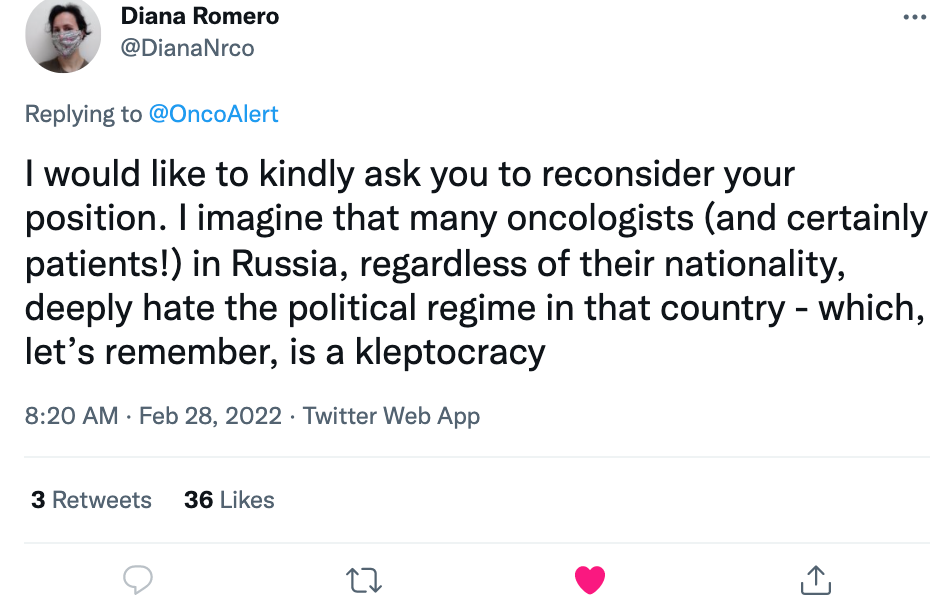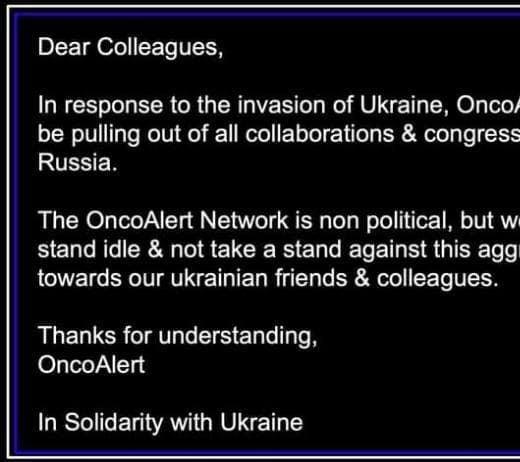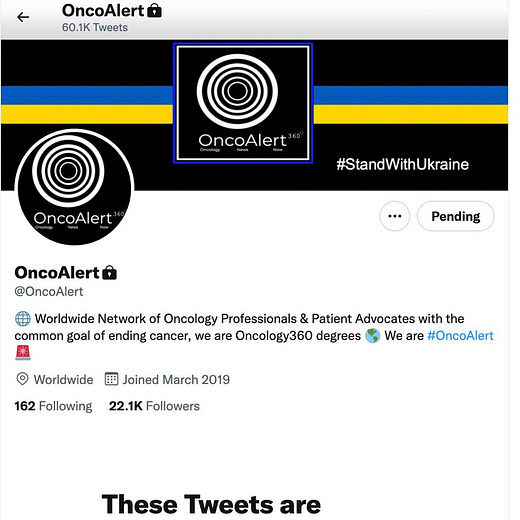OncoAlert's Virtue Signaling Hurts Cancer Patients
Twitter account then goes private
A strange series of events unfolded this week concerning an unofficial cancer group: Onco-Alert. The Onco-Alert network, a collection of cancer doctors, has gained popularity over the last few years on social media. In the wake of the Russian invasion of Ukraine, the group put out this statement:
Very quickly commenters noted that the new policy would punish Russian scientists and Russian cancer patients, who themselves may be opposed to their government’s actions. Diana Romero, the editor-in-chief of Nature Reviews Clinical Oncology, a flagship cancer journal, pushed back:
Other doctor’s added their concern that punishing cancer patients & scientists is not the appropriate counter response:
Finally, the European Society of Medical Oncology put out a statement affirming unconditional support for all cancer patients, irrespective of where they are.
Krystal Ball, co-host of the news show Breaking Points noted this episode:
It appears thereafter, the OncoAlert twitter page protected its content, precluding public viewing
What should we conclude from this episode?
This is a small example, but it touched my field of cancer medicine. It captures many of the problematic themes in our culture today.
First, it is important for many to show that they are on the ‘right side’ of issues. OncoAlert prominently posted their condemnation. They did not need to issue this proclamation. Second, the policy utilized the tool of “cancellation” - we won’t associate with: Russian scientists & we will deny Russian cancer patients our collaborative efforts. This tool is increasingly popular in modern culture. Third, the response was incorrect. It punished the wrong individuals, who may themselves be oppressed, and who are certainly vulnerable (cancer patients), deserving of our support irrespective of the actions of some in their government.
We see these themes everywhere. Individuals wish to show to others that they are virtuous. They choose to do so often with harsh condemnation & dissociating from that person. But that decision: the condemnation itself is often counterproductive or even harmful.
I suspect most involved in this episode are well-intentioned, but the truth about complex health policy is that it requires reflection, consideration, practice, and understanding of intended & unintended consequences. It is not something to be entered into lightly. In a world geared towards gaining status by displaying one’s virtue, we can easily end in ruin for ourselves and more importantly: vulnerable Russian cancer patients.
The only practical lesson I see is next time there is a profound socio-political event, one should feel comfortable not signaling one’s virtue, and being careful that a response does not introduce more problems of it’s own. Policy is tricky. In medicine, many twitter doctors were on the wrong side of the most profound domestic policy decision of our times: school closures. Many of these same forces were in play. Signaling virtue; canceling those who disagreed; hurting vulnerable kids. Onco-Alert made a mistake here; I hope they heed the real lesson: Let evidence, not virtue signaling, guide policy advocacy.











“I don’t know about other people, but when I wake up in the morning and put my shoes on, I think, Jesus Christ, now what?”
— Charles Bukowski
“We see these themes everywhere. Individuals wish to show to others that they are virtuous. They choose to do so often with harsh condemnation & dissociating from that person. But that decision: the condemnation itself is often counterproductive or even harmful.”
I really appreciate this statement. As a person of faith, for example, I see this play out on a regular basis in religious communities. People feel a need to show off how virtuous they are and that often takes the form of excluding people from the community and making its resources scarce.
The worst part is that the people who don’t check all the boxes that the “virtuous” people don’t are the people who often need those resources the most. In the case of churches: community, spiritual uplift, etc. And in the case of the medical community: actual, life-saving support.
It’s a tragedy we judge people like this.